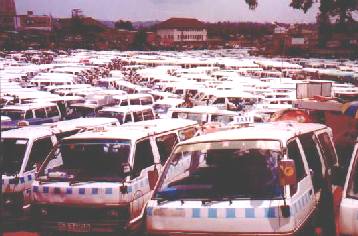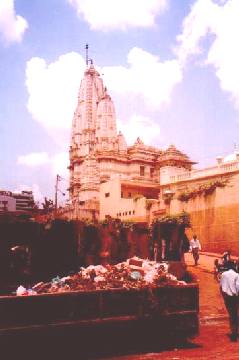Kampala on the Cheap
(Marie-mail #54)
KAMPALA
SEPTEMBER 30
East Africans seem to enjoy scattering their belongings about. One
woman's scarf stretched across the seat in front of me, to the
consternation of the seat's occupant. A plastic bag, overstuffed with clothing, spilled into the aisle from under the seat across from me, and the overhead racks were spilling their contents onto heads with wild abandon.
I was on a "Busscar" overnight bus from Nairobi to Kampala. Sleep had
been an impossibility, as every time I drifted off, the bus would lurch
through a crater, sending my head smacking onto the window or just sideways,
snapping through the air.
We reached the Uganda border early, before it opened. The passengers
welcomed the pause, and slept for forty minutes until Immigration
opened.
The border money changers all wore homemade uniforms — long green
cotton shirts with cutoff sleeves and the words “money changers”
stenciled on the back.
I got ten dollars off my Ugandan visa with my student identity card, and we drove across the border in darkness.
The road became smooth and paved as the sun rose, and I opened my eyes
to get a first look at Uganda.
"Green," I thought. "Bali." But then I realized the deep, rich green
of the countryside, brought on by an unexpectedly early rainy season,
wasn't as green as that fabled paradise. I modified my metaphor — the surrounding countryside and its stalks of bananas loaded onto bicycles — was more like Sumbawa or East Timor.
 crowding the bus
crowding the bus
Occasionally the bus would stop at a police checkpoint and would be
mobbed by snack sellers, who'd push fried-meat-on-sticks through the
open windows. Newspapers were also popular, although they were for reading,
not eating. The snack sellers, like the money changers, all wore similar
uniforms. Ugandans, I thought, dig uniforms.
Sometimes traveling salesmen came on to extol the virtues of a certain
product — little packets of soap or vitamins or whatever he'd managed
to acquire in bulk. The Kenyan man in front of me bought one of everything
offered.
We reached Kampala, a short city choked with diesel fumes, after nine.
I had to wait for all 37 other passengers to disembark, which they did
with great deliberation. To hurry seemed to be unknown in East Africa. When
I got out, the conductor was prancing around wearing my backpack, grinning
devilishly. I laughed, took the bag, and walked out of the bus park
gate.
What a sight awaited me! The Busscar garage overlooked Kampala's "Old
Taxi Park."
 Old Taxi Park
Old Taxi Park
In East Africa, and in unindustrialized countries all over the world,
public transport is in shared minivans that run "when full." "Full"
means fourteen passengers, one conductor, and countless babies and toddlers.
Kampala has two taxi parks. One, the new taxi park, serves destinations to the
south and west. The other, the one I now looked at, serviced the north.
Hundreds of white minivans lined the big, dirty city block, while
conductors hollered out destinations. A thick diesel smell permeated
the air. The Ugandans around me all seemed to be laboriously carrying enormous
packages as they scampered to work.
Dazed, I turned right and aimed for "Tourist Hotel." At $25 a night,
it wasn't cheap, but it was central and featured "top-end quality at
mid-range hotel prices."
In short order, I discovered that my guidebook had exaggerated Tourist
Hotel's qualities. Nevertheless, it seemed safe. And it didn't matter
that CNN's sound didn't work — I could read the banner across the bottom of
the screen.
Barclay Bank's ATM was out of order. Standard Bank's ATM didn't accept
any of my cars and the second Barclay's rejected me as well. It was
Sunday so a cash advance was out of the question. I exchanged all my remaining
traveler's checks at the Sheraton and surveyed my funds. Bleak, I thought. The
permit to see the mountain gorillas — the sole reason I'd come to Uganda — was
$250 and I was only carrying $375.
I'd have to make do. I'd leave the Tourist Hotel in the morning and go
to a backpacker's dorm.
I headed to "Ban Café" for a banana muffin and coffee. The walls there
were covered with newspaper articles about coffee exporting.
Coffee prices were at an all-time low. Farmers were putting the blame
on Vietnam, who they said had flooded the market, and on three multinationals (Sara Lee, Nestle and I've forgotten the other) for making a fortune but passing none of the proceeds back to the farmers.
"Fair trade, not aid," I mused. Perhaps the answers to the world's
problems lay in equitable payment for goods, not in handouts.
Christian radio played in Ban Café, and incongruous soundtrack to my
Ugandan coffee experience. A man from Utah could be heard detailing the
events leading up to his personal salvation.
 still life with dumpster and temple
still life with dumpster and temple
Kampala was dead on Sunday. There was nothing to do but use the
internet and hang around the Sheraton lobby drinking coffee. Still, the
city was pleasant enough, and had begun its recovery from the Idi Amin
years.
OCTOBER 1
When I awoke, Kampala was a different city. The local market was
across the street from the Tourist Hotel, and as they bartered and gossiped at
five a.m., the locals had no interest in letting the tourists get their
beauty sleep. The streets that had been quiet and pleasant yesterday were
today loud and crowded.
Just as well, I thought, getting up and turning on soundless CNN to
the accompanying din of the developing world. I had to go to Ugandan
Wildlife Authority to get my gorilla permit.
Only six tourists get to visit habituated groups every day. In the
past bookings had to be made as much as a year in advance, especially after
the film "Gorillas in the Mist" came out. But in 1999, eight tourists were
kidnapped from Bwindi National Forest campsites. Reportedly their
nationalities were checked. Americans and British were murdered, while some from "friendlier" countries were released. Most likely, the culprits were Congolese rebels who were angry with Uganda's support for the Congo government. Ugandan authorities claimed to have found and executed the perpetrators, but it is equally likely that they escaped back into the Congo and the next best thing had been shot — anyone who could be rounded up on short notice.
My friend Nikki had been at Bwindi just before the massacre, and back
in New York I had read about the tragedy and panicked. I'd been working
as a substitute editor in the Marvel offices at the time, and my boss, who
delighted in bringing me bad news of tourist hotspots (as he knew of my
inclination to visit unsafe areas) had brought me a printout off CNN.com. But a few days later, Nikki e-mailed me from Zimbabwe, safe but worried. She'd know an Acacia overland driver who had been there. One had escaped by showing a second passport from New Zealand.
Now, Bwindi supposedly had an "invisible army," and was the safest
place to see mountain gorillas. I was hoping to go there instead of
Mgahinga or nearby Rwanda, as it was "easiest" to get to Bwindi on my own.
I'd e-mailed ahead to get my permit — twice — but had heard nothing
back. So when I showed up at Ugandan Wildlife Authority's headquarters
on Monday at the crack of dawn, I was delighted to discover I had a
booking to see "Mubare" gorilla group on Wednesday at Bwindi. The permit woman
also booked me into a "banda" at the Community Restcamp — a hut with four beds and a nearby pit toilet. She gave me bus instructions — the bus to Butogota left from "number 19 on the Lonely Planet map" at 0630. It would take eleven
hours, and from Butogota I'd hire a private taxi for 20,000 shillings. That
would take me the last seventeen kilometers to Bwindi.
I paid my $250 cash for the permit — and was left with unnervingly
little. I visited all major banks in town and the American Express
office. No one could give me money, unless I got a Visa cash advance from a
Barclays teller. Instead, I decided to just pay attention to my budget for a
change.
It was easier than I'd expected. I bought bread and made a peanut
butter and jelly sandwich for the bus ride. I switched from Tourist
Hotel to an unappealing, grotty backpacker's lodge two kilometers from town. It
featured three toilets — one was "out of order," one should have been classified "out of order" as it shot cascades of water all over the floor when flushed, and the third always seemed to be occupied by a male who hadn't shut the door. A sign nearby exhorted customers to "use the eco-toilets," a nice way of saying "yeah, these are gross but we have pit toilets down the hill."
Another sign by the showers pointed out that seventy percent of
Ugandans did not have access to clean water, so we should conserve (not
difficult considering the shower taps produced a slow drizzle). I
laughed at the sign — how was my not using water in Kampala going to help someone in the countryside? It was like being told to eat all your dinner because there are children starving in Africa. "They can have my leftovers, give me a DHL box!" Ever try that one on your mom?
After leaving my bag on a thin mattress on a lower bunk in a large,
poorly lit dorm, I caught a matatu back to town.
"Matatu" is just the Swahili word for shared minivan taxi. The matatu
left me at the New Taxi Park. I walked through the chaotic streets of
lower Kampala — it's built on hills and the nice hotels are at the top of the
hills. But the "real" city, where people trade and shop, is below Kampala
Avenue.
I passed a Hindu temple and found ShopRite, where I had to walk
through a metal detector and store my camera before being allowed to enter.
"Is this what we have to look forward to at home?" I wondered. Uganda
has had more than its share of terrorism through the years, and security was
everywhere. At night, guards with weapons patrolled reputable businesses.
Later, when I returned to the hostel, I first overheard the hostel
manager talking conspiracy talk.
"The CIA was in on it," he explained of the September 11th attacks. He
was of the opinion that it was a government plot to get a higher
military budget and take away civil liberties. I just laughed. Because no one
can keep a secret, I only believe in conspiracies where all the conspirators are dead.
He left, and the group of tourists he'd been talking at discussed the
headlines on today's local paper. Everyone was worried because the
headline had been "US, Britain to Attack Afghanistan in 24 hours." I interrupted to set their minds at east — the Ugandan newspapers just wanted to sell its product. CNN had no reports of any scheduled attack appointments.
In the dorm, I lay out my fleece sleepsheet on the mattress to try to
get some sleep, as it was going to be an early morning. But I was out
of luck. First I listened to a German guy trying to flirt with a young Israeli
woman.
"What language do you speak?" he asked.
"Hebrew," she responded.
"What?"
"HEBREW."
He looked puzzled. "What language is that?"
"Hebrew," I interjected. "She's from Israel."
He still looked confused. I gave up. So did she.
Then a group of young Irish men came in. They did gymnastics on the
bed for a while. It was going to be a long night.
NEXT: Gorillas of the Bad Gas. A bus with a flat
tire, and (surprise) another bus with a flat tire!